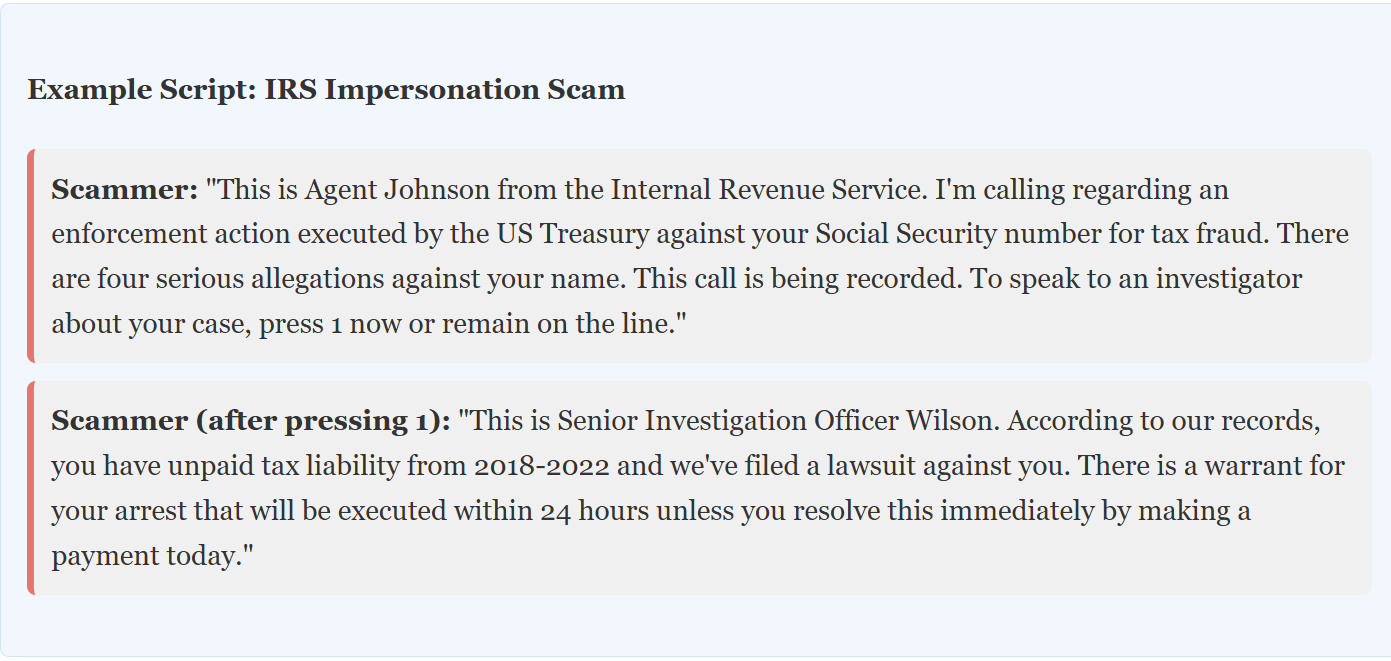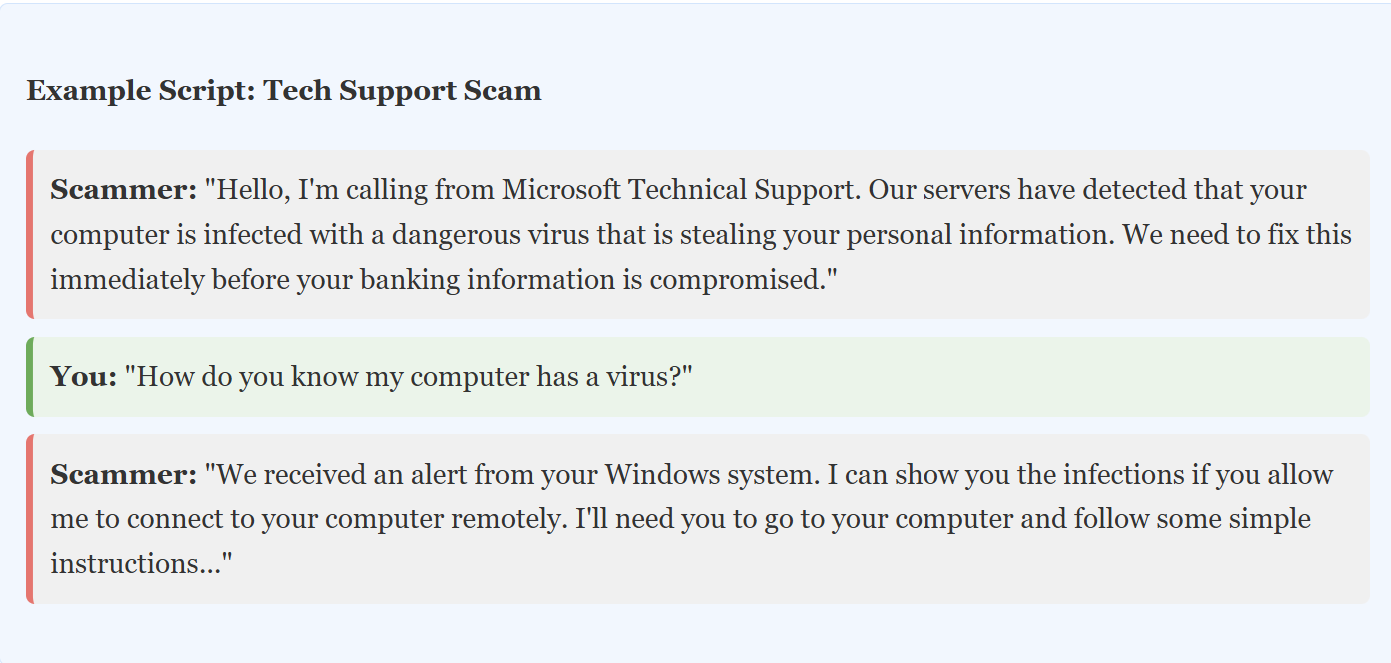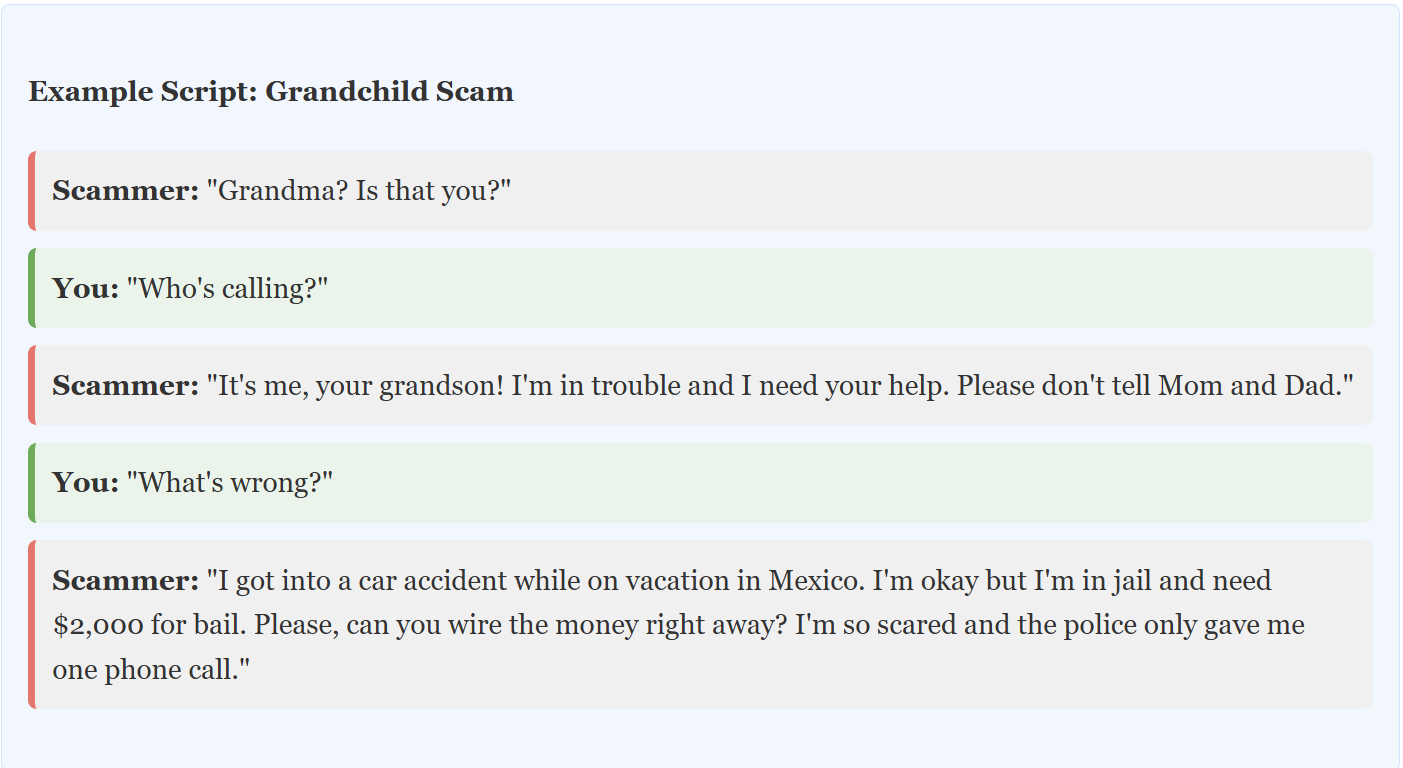Module 4: Phone Call Scams
Introduction to Phone Call Scams
Phone call scams remain one of the most effective ways for scammers to target people, especially older adults. Unlike emails or text messages that can be ignored, a ringing phone often creates a sense of urgency to answer. Once a conversation begins, scammers use psychological tactics and pressure to manipulate victims. In this module, we'll learn how to identify fraudulent calls and protect ourselves from phone scams.
Why Phone Scams Are Particularly Dangerous
Phone scams pose unique challenges for several reasons:
- Human connection: Speaking with a real person creates a personal connection that can lower defenses
- Pressure tactics: Scammers can apply immediate pressure and don't allow time to think
- Emotional manipulation: Voice tone and urgency can trigger strong emotional responses
- Caller ID spoofing: Scammers can make calls appear to come from legitimate organizations
- No paper trail: Unlike emails or texts, there's often no record of what was said
Common Phone Scam Types
1. IRS and Government Impersonation Scams
These scammers claim to be from the IRS, Social Security Administration, or other government agencies. They typically say you owe money or there's a problem with your benefits.

Red Flags:
- The IRS almost always contacts taxpayers by mail first, not by phone
- Government agencies don't threaten immediate arrest
- The caller creates fear and urgency
- They demand immediate payment, often through unusual methods like gift cards or wire transfers
- They don't allow you to question or appeal the amount they say you owe
Protection Tip:
If you get a call claiming to be from a government agency:
- Hang up without providing any information
- Call the agency directly using the official phone number from their website (not the number that called you)
- Remember that government agencies like the IRS will never demand immediate payment over the phone or threaten to bring in police
2. Tech Support Scams
These scammers claim to be from Microsoft, Apple, or other tech companies. They say they've detected viruses or problems with your computer and offer to fix them for a fee.

Red Flags:
- Microsoft, Apple, and other tech companies don't make unsolicited calls about computer problems
- Tech companies cannot detect viruses on your computer remotely
- The caller wants remote access to your computer
- They create fear about security threats or data loss
- They often have foreign accents but use Western names
Protection Tip:
If you get a call about computer problems:
- Hang up immediately
- Never give remote access to your computer to someone who called you
- If you're concerned about your computer's security, contact a local, reputable computer repair service
3. Grandchild/Family Emergency Scams
These scammers call pretending to be a grandchild or other relative in trouble, needing money immediately for an emergency like bail, hospital bills, or to get out of a foreign country. The connection is often poor or the voice is slightly muffled.

3. Grandchild/Family Emergency Scams
These scammers call pretending to be a grandchild or other relative in trouble, needing money immediately for an emergency like bail, hospital bills, or to get out of a foreign country. The connection is often poor or the voice is slightly muffled.

Red Flags:
- The caller is vague and waits for you to provide a name ("Is that you, Grandma?")
- They insist on secrecy ("Don't tell Mom and Dad")
- The situation requires immediate money
- They often claim to be in a foreign country
- They request wire transfers, gift cards, or other non-recoverable payment methods
- They may have another person pose as a lawyer or authority figure to add credibility
Protection Tip:
If you get a call from someone claiming to be a relative in trouble:
- Stay calm and don't act immediately
- Ask questions that only your real family member would know the answer to
- Tell the caller you'll call them back, then use a known phone number to contact your family member directly
- Call other family members to verify the story
- Never send money based solely on a phone call
4. Charity Scams
These scammers pose as charitable organizations, often following natural disasters or major news events, asking for donations.

Robocalls and How to Handle Them
Robocalls are automated phone calls that deliver pre-recorded messages. While some robocalls are legitimate (appointment reminders, school closings), many are scams.
How to Handle Robocalls:
- Don't press any buttons, even if the message says to "press 1 to be removed from our list" (this often just confirms your number is active)
- Hang up immediately on suspicious robocalls
- Register your phone number on the National Do Not Call Registry (donotcall.gov)
- Use your phone's blocking feature to block known robocall numbers
- Consider using a call-blocking app or service offered by your phone provider
Caller ID Spoofing Explained
Caller ID spoofing is when scammers falsify the information that appears on your caller ID to make it look like they're calling from a local number, a government agency, or a company you know.
How Spoofing Works:
Scammers use special technology to change what appears on your caller ID. For example, they might make it look like they're calling from:
- Your local area code (to increase the likelihood you'll answer)
- A government agency like the IRS or Social Security Administration
- Your bank or credit card company
- A well-known company like Microsoft or Amazon
This is why you can't trust caller ID alone to determine if a call is legitimate.
Scripts and Pressure Tactics Used by Scammers
Understanding the psychological tactics scammers use can help you recognize and resist them:
Common Pressure Tactics:
- Creating urgency: "You must decide now" or "This offer expires today"
- Invoking fear: Threats of arrest, lawsuits, computer viruses, or loss of benefits
- Limiting communication: "Don't hang up" or "Stay on the line while you go to the bank"
- Demanding secrecy: "Don't tell anyone about this call" or "This is confidential"
- Claiming authority: Using official-sounding titles and legal terminology
- Building false trust: Being overly friendly or claiming to be "here to help you"
How to Respond to Suspicious Calls
- Don't engage in conversation with suspicious callers
- Never provide personal information to someone who called you
- Use verification phrases like:
- "I don't provide personal information by phone. I'll call you back at your official number."
- "Please send me written information in the mail."
- "I need to consult with my family member/advisor before making any decisions."
- It's okay to hang up on suspicious calls
- If you're concerned the call might be legitimate, hang up and call the organization directly using their official phone number from their website or a bill
Creating a Family Verification System
To protect against family emergency scams, consider creating a family verification system:
Family Code Word System:
- Choose a unique family code word or phrase that all family members know
- If someone calls claiming to be a family member in trouble, ask for the code word
- If they can't provide it, it's likely a scam
- Update this code word periodically
- Discuss this system with all family members, including grandchildren
What to Do If You've Been Scammed by Phone
If you realize you've fallen victim to a phone scam:
- Don't be embarrassed - these scammers are professionals, and many smart people fall victim
- Act quickly - the sooner you take action, the better chance of minimizing damage
- If you shared financial information, contact your bank or credit card company immediately
- If you gave remote access to your computer, disconnect from the internet and have your computer checked by a trusted professional
- Change passwords for any accounts that may have been compromised
- Report the scam to:
- Federal Trade Commission: ReportFraud.ftc.gov or 1-877-382-4357
- FBI's Internet Crime Complaint Center: IC3.gov
- Your local police department
- Monitor your accounts for suspicious activity